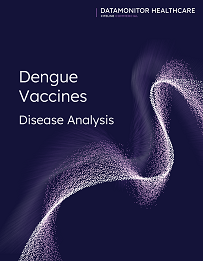Report Library
All Reports
Datamonitor Healthcare Infectious Diseases Disease Analysis: Dengue Vaccines
September 10, 2025
Despite being the first widely marketed dengue vaccine, Dengvaxia’s use has been limited due to major safety concerns. The dengue vaccines market is, however, expected to expand rapidly following the first global approval of Takeda’s live-attenuated vaccine (LAV) Qdenga (TAK-003) in August 2022. The pipeline is limited, with only Merck & Co.’s LAV TV003/TV005 being in late-stage development in dengue-endemic regions. TV003/TV005 was initially developed by the US National Institute of Allergy and Infectious Diseases (NIAID) and has been licensed to the Butantan Institute in Brazil, where it is in Phase III trials, to Merck & Co. in the US, Canada, China, Europe and Japan, and to various other developers in India, the Middle East and Asia-Pacific markets, with the goal of ensuring market access by facilitating cheaper domestic production in key dengue-endemic regions.
Qdenga, a second-generation LAV, is the most promising pipeline candidate and is expected to supersede Dengvaxia. Given Qdenga’s clean safety profile, better dosing schedule and strong efficacy in both seronegative and seropositive individuals, we expect that it will rapidly achieve market leader status. Phase III data indicate that Qdenga has a major competitive advantage of being efficacious regardless of serostatus, which makes it a much more attractive candidate for national immunization programs, since parallel serostatus screening programs are not required. Importantly, this also places Qdenga in a position to establish a monopoly in the lucrative traveler market, given that Dengvaxia’s inconvenient dosing schedule and lack of efficacy in seronegative individuals effectively preclude its use in this setting. Moreover, Qdenga is ahead of rival vaccines, having been approved in Indonesia and the EU, and with other regulatory filings having occurred in several dengue-endemic regions in Asia and Latin America. Additional advantages include the vaccine’s favorable two-dose schedule (at 0 and 3 months), which will likely have a higher compliance rate than Dengvaxia’s three-dose regimen (at 0, 6 and 12 months), and the wider target age range (4–16 years), which will address the unmet need of providing an immunization strategy for younger children. A major caveat for the vaccine is the waning of immunogenicity between 24 and 36 months post-vaccination; however, to deal with this issue, Takeda is assessing a booster dose to restore protective efficacy to its previous peak.
| Indications Covered: | Dengue Fever - Vaccines and Treatments |
